|
|
|
Sort Order |
|
|
|
Items / Page
|
|
|
|
|
|
|
| Srl | Item |
| 1 |
ID:
181037


|
|
|
|
|
| Summary/Abstract |
Across the Global South, authoritarian rule and extractivist agendas have intensified the harassment and murder of activists protecting remnant forest frontiers. In 2017, Global Witness documented the brutal murders of 207 defenders, the deadliest year on record. In the Philippines, violence against defenders has recently accelerated under the increasingly authoritarian regime of President Rodrigo Duterte. Excluding drug-related extrajudicial killings, an additional 30 murders were documented in the country in 2018, the highest number of such killings in any country that year. Largely because of expanding plantations and mines, the frontier province of Palawan has experienced a surge in land grabbing and illegal logging, driving defender harassment, intimidation, and death. While scholars have explored the trends and patterns behind violence against defenders in Southeast Asia, few have considered how the rural poor emerge as activists, the role of NGOs in this process, and how defenders negotiate their activism with everyday life and livelihood. This study fills this gap by ethnographically examining how NGOs on Palawan island mobilize rural communities to shape defender practices and by exploring why defenders do what they do amid mounting threats against them, their loved ones, and their comrades across the island.
|
|
|
|
|
|
|
|
|
|
|
|
|
|
|
|
| 2 |
ID:
188446
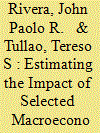

|
|
|
|
|
| Summary/Abstract |
As economic activities came to a standstill during the COVID-19 pandemic, the Philippines, like many economies across the globe, experienced rising inflation, currency depreciation and fluctuating capital markets. To manage these variables and stabilize the macroeconomy, the central bank resorted to monetary tightening. In the Philippines, a key mechanism that contributes to this stabilizing effect rests on remittances that have been cushioning the economy from the effects of volatilities and uncertainties in the global economy. During economic downturns and reduced capital flows, remittances provide support not only to recipient households but also to the country’s financial sector. Using time series analysis, we estimate the response of remittance inflows on impulses from selected macroeconomic variables, namely interest rate, inflation rate and exchange rate. A common characteristic shared by the selected indicators is their influence on recipient households’ consumption-related decision-making process. These findings warrant the need to redesign major institutional policies to manage remittances in light of their anticipated feedback effect on the economy.
|
|
|
|
|
|
|
|
|
|
|
|
|
|
|
|
| 3 |
ID:
151701


|
|
|
|
|
| Summary/Abstract |
Insurgencies thrive in regions where government legitimacy is absent. In the post-war Philippines, Captain Charles T. R. Bohannan of the Army’s Counter Intelligence Corps became actively aware of this dynamic. Bohannan is best known for his later work with Edward Lansdale and Ramon Magsaysay in defeating the Huk Rebellion (1950–1954). Here the author examines Bohannan’s early investigative work against Japanese war criminals, wartime Filipino collaborators, and the rising threat of communist subversion most associated with the Huk. All of these experiences fed into what would be the successful campaign against the Huk, chronicled in his seminal work, Counter Guerrilla Operations: The Philippines Experience, and offers lessons on the investigative (as opposed to tactical or psychological) nature of effective counter-insurgency work, as it relates to both legitimacy in governance and the rise of insurgencies.
|
|
|
|
|
|
|
|
|
|
|
|
|
|
|
|
| 4 |
ID:
143899
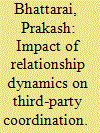

|
|
|
|
|
| Summary/Abstract |
A growing field within mediation research explores issues of third-party coordination. The existing literature highlights third-party coordination as a problematic but extremely important conflict intervention strategy, but lacks an in-depth explanation of fundamental aspects of third-party coordination. Considering this research gap, this study explores a fundamental theme related to third-party coordination: the influence of third-party relationship dynamics. This theme is elaborated by means of an analysis of two case studies: the Maoist armed conflict of Nepal and the Moro conflict of the Philippines. My research finds that power differences among third parties, their attitudes towards each other, differences in intervention strategies and priorities, the nature of conflicts, and the actions taken by the conflicting parties are key contextual factors that influence the dynamics of third-party relationships. Successful coordination is more likely when there is interdependence and a sense of respect between third parties.
|
|
|
|
|
|
|
|
|
|
|
|
|
|
|
|
| 5 |
ID:
159799
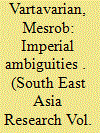

|
|
|
|
|
| Summary/Abstract |
This article examines relations between American imperial personnel and indigenous Muslims in the southern Philippines from the colonial advent to the post-colonial present. American officials initially established imperial linkages with Muslims that bypassed emerging political arrangements in core Christian areas. In ruling different Filipinos disparately, Christian and non-Christian zones of the archipelago assumed separate developmental trajectories. Muslims were racialized and forcibly modernized, but stood apart as a peripheral minority. Although sub-national imperial connections were severed after 1913, Muslims retained a memory of a distinct relationship with the United States that benefited local interests and contained government violence when the Americans returned to fight a war on terror at the beginning of the 21st century.
|
|
|
|
|
|
|
|
|
|
|
|
|
|
|
|
| 6 |
ID:
144844


|
|
|
|
|
| Summary/Abstract |
The promotion of intensive farming through organic and fair trade certification appears contradictory to the increasing significance of non-farm income sources in rural Asia as well as in many other parts of the rural South. By observing a sugarcane producer co-operative comprising land reform beneficiaries in the Philippines, this paper explores the reality of livelihood diversification as practised by member households of the certified co-operative, focusing on the compatibility of certification-supported farming with diversified activities. In this case, diversification at the household level progressed both away from farming and into farming. Behind the long-term use of agricultural certification, there are compelling reasons for continuing both certification-supported farming and diversified activities, and for employing mechanisms that further the compatibility at all phases between the former and the latter, and maximising income-generating opportunities. The operation of communal land with agricultural certification may be an effective form of assistance to land reform beneficiaries who share a strong desire to be landowners.
|
|
|
|
|
|
|
|
|
|
|
|
|
|
|
|
| 7 |
ID:
167182
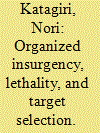

|
|
|
|
|
| Summary/Abstract |
I examine the relationship between organizational stability, lethality, and target selection, and attack method of Southeast Asian insurgency. I do so by comparing the Abu Sayyaf Group (ASG) and Jemaah Islamiyah (JI), using data of their activities between 1994 and 2015. I make two arguments. First, organizationally unstable insurgency groups tend to see their members increase generate more casualties, while stable groups often experience reduction of violence. Second, organizational instability makes it more likely for groups to target civilian populations and business infrastructure than government, military and police forces, and transportation buildings. In contrast, organizational stability has limited explanatory power on its attack methods.
|
|
|
|
|
|
|
|
|
|
|
|
|
|
|
|
| 8 |
ID:
156693


|
|
|
|
|
| Summary/Abstract |
This article analyzes the unique trajectory of the Philippine gaming industry, with a particular focus on the Philippine Amusement and Gaming Corporation (PAGCOR) and the Philippine Charity Sweepstakes Office (PCSO). It aims to provide empirical insight on how state and non-state actors take part in the growing gaming industry in the Philippines in a neoliberal context. This article first addresses the dominant patron-client paradigms, and finds them insufficient to provide an explanation to both the gaming development in the country and the regulatory mechanisms behind this industry. By providing a description of how PAGCOR and the PCSO circumvent dysfunctional bureaucracy and assuage criticism against systemic corruption, this article suggests that a closer look at the complex networks between stakeholders in both the public and private sectors will provide an alternative way of understanding Philippine politics. The strategic decision by the weak Philippine state to invest heavily in the gaming industry presents a clear example of how these complex networks operate. The gaming regulatory policy pragmatically employs current Philippine laws to ensure maximum profit for the state. This article concludes that a critical examination of the gaming industry is necessary, spanning both the legal and illegal types and the social relations of confidence and suspicion between public and private stakeholders.
|
|
|
|
|
|
|
|
|
|
|
|
|
|
|
|
| 9 |
ID:
181874


|
|
|
|
|
| Summary/Abstract |
The Philippine Navy is among the weakest of the naval forces in the Southeast Asia region, and its power projection capabilities are very limited. It is surprising how the Philippines, an archipelago country involved in maritime territorial disputes, could ignore the development of its maritime forces. As a result, the position of the Philippines in regional territorial disputes is weak. This study analyses the factors which have led to this situation, the PN modernisation process, and Filipino maritime power projection capabilities. The text is divided into three parts. The first defines the term “power projection” (or “force projection”). The second analyses the Philippines’ security challenges. Later, the potential and modernisation of the Philippine Navy, as well as its maritime power projection prospects, is analysed. The study concludes with findings. This study employs descriptive methodology and uses data from readily accessible sources to assess critically the conditions of this naval force.
|
|
|
|
|
|
|
|
|
|
|
|
|
|
|
|
| 10 |
ID:
158091
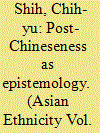

|
|
|
|
|
| Summary/Abstract |
The current study relies on the social psychological notion of altercasting and the anthropological notion of post-Chineseness to appreciate the identity strategies of the Philippine’s China watchers. Basically, the case study suggests that the attainment of the sympathetic capacity to understand China can enrich the knowledge of those China watchers coming from an external position. However, adhering to an internal position of China watching would disempower ethnic Chinese scholars in the Philippines in fully participating in the indigenous community. Therefore, in the long run, the trend is for all ethnic scholars to establish distance from internal perspectives on China and practice watching China from the outside from time to time.
|
|
|
|
|
|
|
|
|
|
|
|
|
|
|
|
| 11 |
ID:
189048


|
|
|
|
|
| Summary/Abstract |
Under pressure to choose between the U.S. and China, Southeast Asian countries have adopted a hedging strategy: deepening economic relations with China while strengthening security cooperation with the U.S. How does the region's public view this strategy? With tensions rising in South China Sea territorial disputes, are more nationalistic individuals more likely to oppose hedging? Using an original public opinion survey conducted in the Philippines, we find that while an overwhelming majority of respondents were concerned about the territorial disputes, more nationalistic Filipinos were no more concerned than less nationalistic ones. Further, more nationalistic Filipinos were more likely to view economic relations with China as important for the Philippines and to approve of Duterte's China policy, which follows the logic of hedging. These surprising findings suggest that under the shadow of great-power competition, the link between domestic politics and foreign policy is nuanced in the Philippines, and Southeast Asia in general.
|
|
|
|
|
|
|
|
|
|
|
|
|
|
|
|
| 12 |
ID:
143666
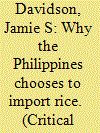

|
|
|
|
|
| Summary/Abstract |
Embedded in the debate in the Philippines over food security and food sovereignty are three conventional reasons why the country is a longstanding rice importer: geography, exploitative international policy pressure predicated on the dictates of neoliberalism, and colonial history. This paper argues that these conventional reasons share two limitations. First, they attribute mono-causal reasons for perennial rice imports, either in the form of geography, exogenous power, or history. While these perspectives are not wrong, each on its own is inadequate. Multiple, contributing factors have and will continue to abound. Second, each of these arguments limits Filipinos' agency. Through a four-part argument, I show how Filipinos have had more say in the reasons for serial rice imports than these conventional accounts allow.
|
|
|
|
|
|
|
|
|
|
|
|
|
|
|
|
|
|
|
|
|